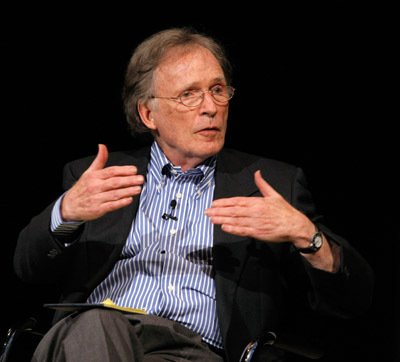Anthony Burgess: I want to ask you a very fundamental question.
Dick Cavett: Yeah.
Burgess: And before I ask you it, I’m going to answer it myself. In my own terms. This is this: People have asked me, “Why do you write books?” My answer is, “I write books for a living. Because there’s no other job I can do successfully or with any measure of expertise.” Obviously, you have another kind of living. Therefore, why did you write this book?
Cavett: It’s that…
Burgess: You didn’t write this book for money, did you?
Cavett: No. In fact, I’ve been told there’s no money in books.
Burgess: There is no money in books. It’s quite so.
Cavett: Well, that in itself would explode a myth, I think, for most people, who must think, “Hey, so and so’s on the bestseller list. He must be raking it in.”
Burgess: No, that’s what — Barbara will, Barbara would say something very apposite of all that.
Barbara Howar: If she were here, she would. (laughs)
Burgess: Well, yes, quite obviously. No, but nobody, nobody writes books, I think, with the intention of becoming rich overnight. The person who believes he’s going to write a bestseller, and be famous and wealthy forever, is very rare. I write books — probably my two friends here write books — because it’s a trade. It’s a trade we can carry out more or less successfully. We’re happy to have made a thing. The only moment of joy we have is that moment when the proof copy comes — you know, when what’s between you and the printer, more or less. After that, the thing is launched. It’s somebody else’s concern. But back to this question.
Cavett: Yeah.
Burgess: Why did you write this book?
Cavett: I seem to have evaded your question.
Burgess: You really did.
Cavett: Partly there’s a practical reason. Publishers constantly asked me, “Because you’re on television, you ought to write a book.” And I thought, “Well, maybe there’s something to that. But I have no idea how.” But I guess I wanted the experience of knowing what it is like to get something down the way you want it…
Burgess: Right.
Cavett: …rather than the frustration of when you’re on television. Everything is sort of off the top of your head. It’s ad-libbed. It’s about the way you wanted it. Sometimes better than you thought. Sometimes worse. Never quite the way you planned. And I somehow envied writers, the idea that you could get a thing and finish it the way you want it, and then pass it on. And then also to put an end to a certain irritating and repeated questions year after year about myself that people constantly ask me. I think, maybe this will stop that now and I can move onto something else.
Howar: To set the record straight.
Cavett: Is that the answer you wanted?
Burgess: There was another answer I thought you might give. But we all know, and it’s repeated in the book, that you are one of the few people alive — perhaps the only person alive — who has read all of Henry James’s novels.
Cavett: Well, I…that’s a terrible thing to know about me. But in fact…
Burgess: But it’s true. It’s true.
Cavett: There may have been some I missed. I think that may have been exaggerated by a journalist.
Burgess: Well, you admit it in this book. Now the point is that I have a feeling that you have a literary ambition.
Cavett: Really?
Burgess: And that this talk show business is a kind of — what’s the French word? Pis-aller. It’s a second best. But your real ambition is to use words in some permanent form. And this is a shy attempt at showing yourself to be a literary practitioner.
Howar: Exactly, Anthony. He has a very nice use — a command of the English language. And you’ve got a romance going with it, whether you know it or not.
Cavett: Ain’t it the truth?
Howar: It sure am. And I want to take Anthony’s question a step further. Why, when you have made your career in television and you have had a reputation for being a cold cucumber and not exposing much of yourself, you would say, “Oh, Cavett doesn’t go into his own feelings.” And all of a sudden…
Cavett: Can’t get off that word, can you? When you’re exposing.
Howar: …exposing them. Well, I…
Cavett: Good.
Howar: And then all of a sudden you writing a book, which is really very revealing. I mean, the jump between — I mean, do you really feel that you might have let ABC down because you didn’t expose yourself on the airwaves again?
Cavett: (laughs)
Howar: And then for Harcourt Brace, you’ve just let it all show.
Cavett: I never thought how I would write the thing. [Co-author Christopher] Porterfield came up with a way of writing it, which I could never come up with. And I know him to be an organized and talented person. And I thought, “Well, it would be good to work with him on something.” And it would be about me, which, of course, is a fascinating subject to me. As Noel Coward once said, “I find the subject endlessly fascinating.” He said. But, uh, I don’t know. I guess I can’t quite answer that. Except that once you get going, the only way to do is to open it up. And the myth of it. It’s very hard to be honest about yourself. It turns out to not be so true. In fact, in a way, it’s kind of sickeningly exhilarating.
Burgess: You are interested in words, right? You are concerned about words.
Cavett: Yeah.
Burgess: You’re the only person on this kind of business who is concerned about words. Most of the talk show pundits one sees that fit — that thin man with the fat jackal, I forget their names. The rest of them. Vermin Griffin or some such name. These other people. They’re full of expletives. They’re full of sounds like “Yeah. Yeah, ” and “I guess so.” And “Wow.”
Howar: Sounds like the White House Tapes.
Burgess: But I…
Cavett: And they’re all very good friends of mine.
Burgess: But this show — this show that I know. The only popular show of that is built on language. Am I right in saying that? It’s your aim to build this thing on language.
Cavett: No. You’re wrong. It’s not my aim. It may have accidentally happened. That my obsession with words has just come out or something. But it’s not an aim. In fact, I’ve never had an aim. Any real aim. But I would like to hear you comment on this. You said that you could never write a book that’s very personal. I suggest that maybe you’d find it sickeningly easy to do so. Because haven’t we all had the experience of spilling our guts to a stranger on a train? Or in a sidewalk cafe? Am I the only one?

 Correspondent: I’m curious about this period of you coming to New York. Coming into town. You’re on the prowl trying to get work as an actor. Before you eventually become a copy boy for Time Magazine.
Correspondent: I’m curious about this period of you coming to New York. Coming into town. You’re on the prowl trying to get work as an actor. Before you eventually become a copy boy for Time Magazine.